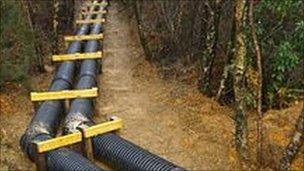River Rheidol filter cuts pollution from mine
- Published
A mine pollution project could be rolled out across Wales after harmful metals entering a Ceredigion river fell by 99%.
Cwm Rheidol mine, near Aberystwyth, has historically discharged large amounts of zinc and other metals, which can harm fish, into the River Rheidol.
The Environment Agency said a filter of compost, limestone and cockle shells had helped pollution levels plummet.
The pilot aims to bring the Rheidol's water quality up to EU standards.
The agency said about 125 miles (200km) of Wales's rivers were affected by pollution from mines.
Cwm Rheidol mine has been abandoned for nearly a century and is connected to several other mines, all of which drain into the river.
The Environment Agency said last year the river had a relatively high concentration of zinc, which put it in danger of not reaching a "good ecological status" target by 2015.
Toxic metals are being removed from the mine water before it enters the Rheidol, using an environmentally-friendly method that requires no energy source apart from gravity.
Results from the last 12 months show removal rates of up to 99% for zinc, lead and cadmium, which are harmful to marine wildlife.
Paul Edwards, of the Environment Agency, said: "Results from this innovative pilot scale scheme at Cwm Rheidol show that this is a viable process for treating mine water pollution that could prove beneficial to sites elsewhere in Wales in the future.
"If the scheme at Cwm Rheidol was implemented at full scale, it is estimated that up to 98 tonnes of harmful metals could be prevented from entering the River Rheidol each year.
'Challenging targets'
"This could be instrumental in helping us achieve some of the challenging targets set by the water framework directive in parts of Wales."
The treatment system was designed by Newcastle University.
It consists of large tanks which contains a mixture of compost, cockle shells and limestone.
The bacteria within this mixture removes metal from the water.

A pipeline has been built to carry the mine water to a treatment works
In the past the method has successfully removed iron from coal mine waters, but this is the first time it has been used to treat water passing through old metal mines.
But Mr Edwards remains optimistic about what the Environment Agency can achieve as it strives to meet tough European water quality standards.
Some of the most polluted metal mine sites in Wales are in Ceredigion, according to the Environment Agency.
Mining took place in Cwm Rheidol from the Bronze Age to just before World War I.
A filter system was developed in latter years, but the Environment Agency said it did not work and polluted water from the mine was still ending up in the River Rheidol.
In the UK, no-one can be held liable for the pollution from mines that were abandoned before 1999, including all the lead, zinc and copper mines in west Wales.
- Published20 September 2010